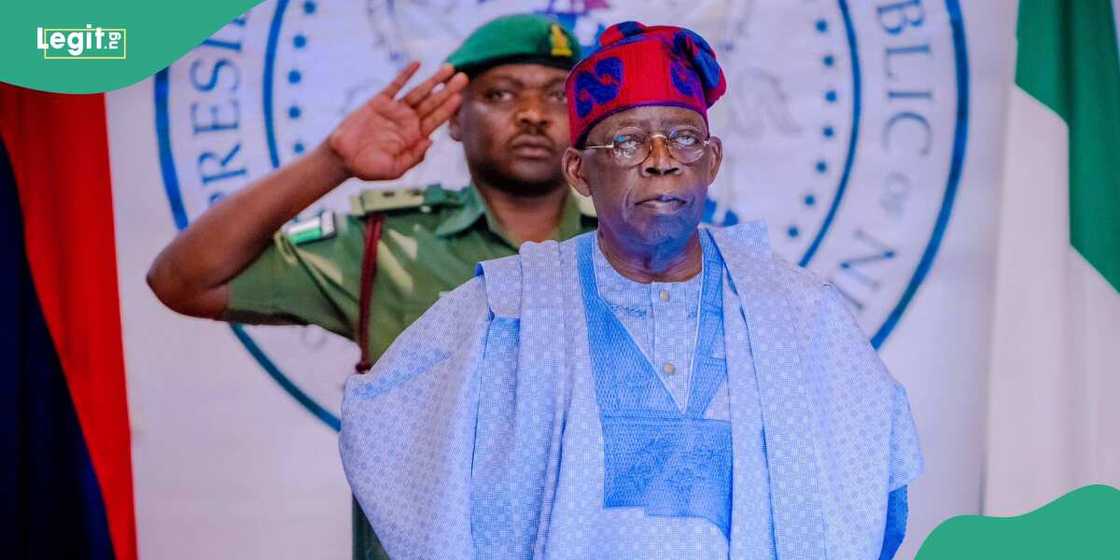Tinubu Lauded As Capital Expenditure Exceeds Recurrent, Allegedly for the First Time Since 1999
- President Bola Tinubu has been hailed for reaching another economic milestone in less than a year
- The Independent Media and Policy Initiative (IMPI) said Tinubu's government has been able to break a jinx of more than two decades
- It was gathered that Tinubu's administration was lauded for allowing capital expenditures to exceed recurrent for the first time since 1999
PAY ATTENTION: The 2024 Business Leaders Awards Present Entrepreneurs that Change Nigeria for the Better. Check out their Stories!
Legit.ng journalist Segun Adeyemi has over 9 years of experience covering political events, civil societies, courts, and metro
FCT, Abuja - The Independent Media and Policy Initiative (IMPI) praised the federal government for prioritising capital expenditure over recurrent spending in the latest budget, marking a significant departure from previous budgets under the current democratic regime.
Chairman Niyi Akinsiju, in a statement, highlighted this shift as a sign of the government's genuine commitment to fostering tangible economic development.

Source: Facebook
According to the policy think tank, the decision to allocate more funds towards capital projects in the 2024 budget, breaking a 24-year trend, demonstrates a dedication to rectifying the longstanding imbalance between capital and recurrent expenditures.
With a spending plan of N28.7 trillion, this strategic approach to budget allocation offers numerous advantages.
IMPI said:
"From an analytical point of view, a budget with higher capital expenditure than recurrent is not only a driver of economic growth, it also impacts individual citizen's quality and way of life.
"In this regard, we concur with the 2019 submission of the Nigerian Institute of Social and Economic Research (NISER) that the only way to bring about a meaningful influence on the economy is to monitor and evaluate funds that are specially intended for capital expenditure and capital projects.
"It would, however, appear that the disequilibrium between capital and recurrent expenditures has been eventually corrected.
"For the first time in the current democratic dispensation, the 2024 budget, which is the first in the tenure of the President Bola Tinubu administration, has more funds allocated to capital expenditure than recurrent."
Shortcomings of previous administration
The policy think tank also lamented how previous administrations had failed to capitalize on two oil booms to boost infrastructural development in the country through higher capital votes.
The policy think tank expressed disappointment over past administrations' missed opportunities to utilize two oil booms to advance infrastructure in the country through increased capital investment.
Despite substantial economic growth, averaging between 6 and 8 per cent from 2006 to 2013, as reported by the World Bank, the additional revenue primarily supported public sector employees.
During this period, recurrent expenditures consistently outweighed allocations for capital projects.
Nigeria's recurrent spending, covering personnel expenses, overhead costs, and service-wide votes, consistently surpassing 65 per cent of total budgets and a significant portion of revenue.
The IMPI said:
"We consider it even more depressing that despite the incongruent budgetary imbalance, the country has, since 2009, been recording yearly budget deficits that average N3.3trn in recent years aggravated by oil price volatility and post-COVID economic debilitations in recent years.
"Budget Office data show that between 2011 and 2021, the Federal Government of Nigeria spent N29.3 trillion on (non-debt) recurrent expenditure while it earned N33.2 trillion revenue during this period. This means that what went into capital projects was extremely negligible."
IMPI remains optimistic that President Tinubu's cost-saving initiatives will result in a greater allocation of funds to the capital segment of the budget.
Buhari's aide slams Tinubu over economic hardship
In another report, President Tinubu has been slammed by Bashir Ahmad, a former aide to ex-president Muhammadu Buhari, over criticism of the latter.
Ahmad tweeted while reacting to a PDP chieftain who tackled the APC government for always blaming the previous administrations for its shortcomings.
The former presidential aide said the PDP appears more politically skilful than the ruling APC when it comes to covering up.
PAY ATTENTION: Unlock the best of Legit.ng on Pinterest! Subscribe now and get your daily inspiration!
Source: Legit.ng


